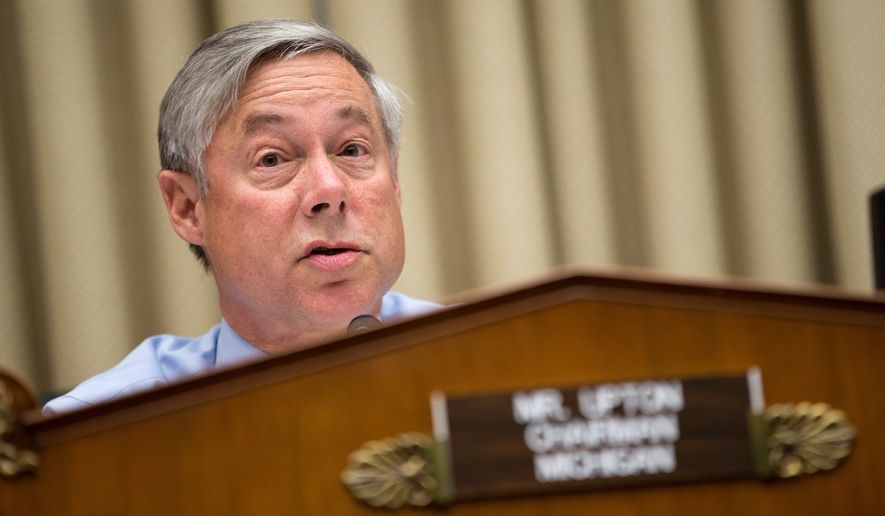Republicans’ latest attempt to slow the Obama administration’s climate change agenda calls for new regulations to be halted until all legal challenges are settled — an argument similar to the one President Obama has used when blocking the Keystone XL oil pipeline.
The House Energy and Commerce Committee has begun work on legislation that would temporarily stop implementation of the administration’s Clean Power Plan, designed to force states to dramatically cut carbon pollution. The pollution reductions envisioned by the Environmental Protection Agency could only be achieved by addressing emissions from power plants, particularly coal-fired facilities.
More than a dozen states, along with major energy companies, already have filed lawsuits challenging the EPA plan, which is set to be finalized this summer. The first such cases will come before a federal court Thursday, with West Virginia and Ohio-based Murray Energy Corp. leading challenges to the EPA’s legal authority to impose the cuts.
Some congressional Republicans expect the courts eventually to strike down the EPA proposal. They argue that, given the uncertainty around the plan and the fact that states could end up wasting a great deal of time and money developing carbon-reduction plans that ultimately aren’t unnecessary, the regulations should not go into effect until courts have ruled on all legal challenges.
“Given that so many states have raised serious concerns about the legality of EPA’s proposed rule and a dozen have already sued, it makes sense to clear things up legally before the rule’s costly and complex requirements take effect,” said Rep. Fred Upton, Michigan Republican and chairman of the House Energy Committee, during a hearing on the draft legislation Tuesday morning.
Allowing legal challenges to run their course has been a central part of Mr. Obama’s approach to the Keystone pipeline, which remains in limbo despite more than six years of federal review.
SEE ALSO: IMF cuts growth forecast for U.S., sees pickup in Europe, Japan
Early last year, a Nebraska court temporarily struck down Keystone’s proposed route through the state. Immediately after that decision, the State Department stopped all environmental review of the project, saying the legal situation must be cleared up first. A final State Department review of the pipeline is needed before the president makes his final decision.
The Nebraska Supreme Court this year upheld the route, but Mr. Obama in February still vetoed a bill approving Keystone, citing the fact that the State Department hadn’t yet completed its work.
In the case of new EPA regulations, the administration is taking a much different position.
EPA officials say badly needed climate change regulations shouldn’t be opened up to the host of lawsuits that would result from the GOP bill.
“This could lead to unlimited delay in the amount of time that would go by before steps would be taken” to implement the plan, Janet McCabe, EPA’s acting administrator for the Office of Air and Radiation, told Congress on Tuesday. “It would clearly delay the [carbon emissions] reductions that are to be achieved through this program it would create additional uncertainty, and one of the things we always hear from the power sector is that certainty is one of the most important things for them.”
Ms. McCabe maintained that EPA’s proposal ultimately will save consumers money by increasing energy efficiency and, by extension, decreasing electricity usage.
SEE ALSO: Hillary Clinton goes unnoticed at Chipotle in botched retail politicking bid
But critics, including lawmakers of both parties and utility companies across the country, say that in order to comply with EPA regulations, states would have to spend billions of dollars retrofitting existing plants to burn natural gas or invest in more expensive forms of power generation, such as wind or solar power.
In any case, they say new costs would be passed on to consumers.
“The truth is that Florida cannot comply with EPA’s proposal using its existing utility investments, and the overall utility cost impacts would likely total in the billion, and perhaps tens of billions, of dollars,” Lisa Johnson, CEO and general manager of Florida-based Seminole Electric Cooperative, told Congress.
Ms. Johnson testified on behalf of the National Rural Electric Cooperative Association, which represents more than 900 nonprofit rural electric cooperatives.
• Ben Wolfgang can be reached at bwolfgang@washingtontimes.com.




Please read our comment policy before commenting.